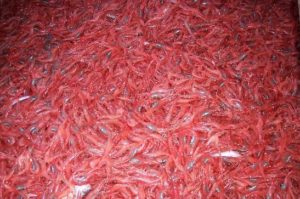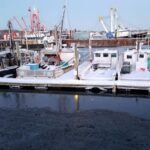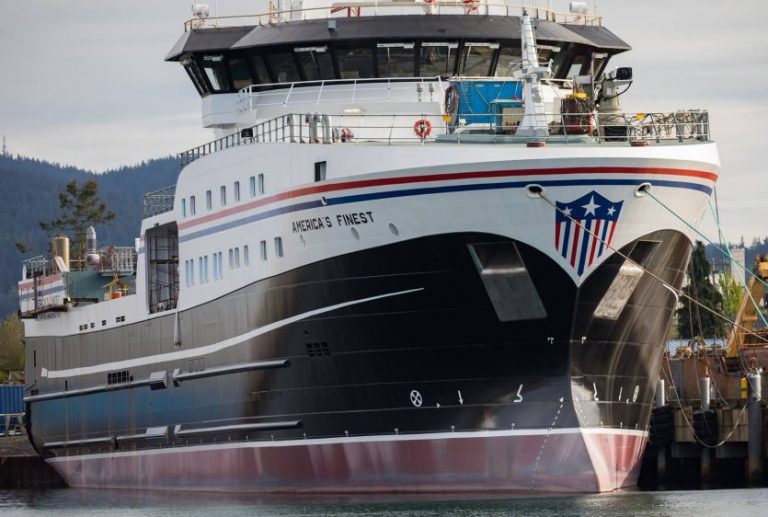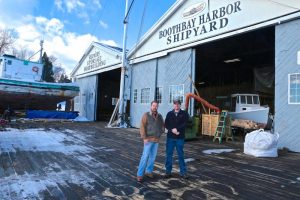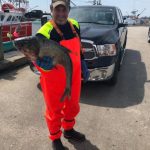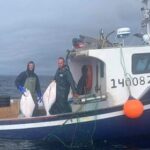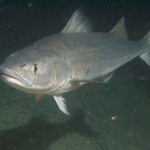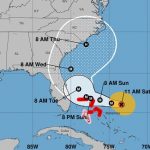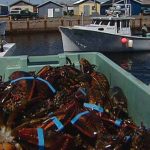Tag Archives: Nunavut
Baffin Fisheries’ new ship stranded in Athens after engine fails on maiden voyage
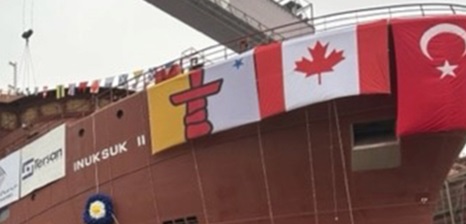 Crew members aboard Baffin Fisheries’ Inuksuk II have spent more than 14 days docked in Athens, Greece after an engine failure stalled the fishing vessel on its first voyage. “We are very disappointed. This was entirely unexpected,” Baffin Fisheries CEO Chris Flanagan said in an interview. “We knew there would be some break-in period and glitches with a brand-new vessel. There always are and that’s expected. But we didn’t expect anything like this to happen.” more, >>CLICK TO READ<< 19:12
Crew members aboard Baffin Fisheries’ Inuksuk II have spent more than 14 days docked in Athens, Greece after an engine failure stalled the fishing vessel on its first voyage. “We are very disappointed. This was entirely unexpected,” Baffin Fisheries CEO Chris Flanagan said in an interview. “We knew there would be some break-in period and glitches with a brand-new vessel. There always are and that’s expected. But we didn’t expect anything like this to happen.” more, >>CLICK TO READ<< 19:12
Storm Brewing over French Halibut Fishery in Atlantic Canada
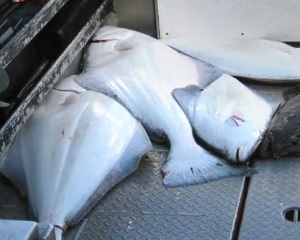 The Canadian halibut industry is accusing France of seeking an exorbitant share of the fishery in negotiations with Canada on quotas for the valuable groundfish that migrate across the jurisdictions of both countries. Canadian fishermen from Nova Scotia to Nunavut would be the losers if France prevails, said Bruce Chapman, executive director of the Atlantic Halibut Council, representing both inshore and offshore Canadian harvesters. French territorial waters extend into the Atlantic from the islands of Saint Pierre and Miquelon, 25 kilometres from the southern coast of Newfoundland and Labrador. more, >>CLICK TO READ<< 06:41
The Canadian halibut industry is accusing France of seeking an exorbitant share of the fishery in negotiations with Canada on quotas for the valuable groundfish that migrate across the jurisdictions of both countries. Canadian fishermen from Nova Scotia to Nunavut would be the losers if France prevails, said Bruce Chapman, executive director of the Atlantic Halibut Council, representing both inshore and offshore Canadian harvesters. French territorial waters extend into the Atlantic from the islands of Saint Pierre and Miquelon, 25 kilometres from the southern coast of Newfoundland and Labrador. more, >>CLICK TO READ<< 06:41
Marine Science Vessel Celtic Voyager Sets Sail to Canada
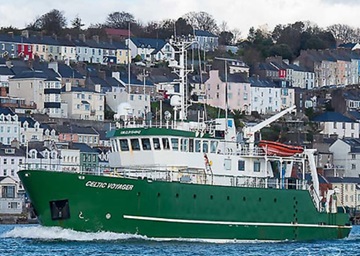 The Marine Institute’s Celtic Voyager, Ireland’s first multi-purpose research vessel, has been sold to Qikiqtaaluk Corporation of Nunavut, Canada. The vessel has played a significant role in advancing marine science and monitoring for the Irish government during its 25-year service life and has completed more than 600 surveys, enabled more than 6,500 science days, and sailed more than 550,000 miles while in service with the Marine Institute. The vessel will continue to be used for fisheries research and seabed mapping in Northern territories and Nunavut in Canada. Qikiqtaaluk Corporation is the Inuit birthright development corporation for the Qikiqtani Region and seeks to strengthen the social and economic well-being of Nunavut and the 15,000+ Inuit it represents. more, >>click to read<< 08:43
The Marine Institute’s Celtic Voyager, Ireland’s first multi-purpose research vessel, has been sold to Qikiqtaaluk Corporation of Nunavut, Canada. The vessel has played a significant role in advancing marine science and monitoring for the Irish government during its 25-year service life and has completed more than 600 surveys, enabled more than 6,500 science days, and sailed more than 550,000 miles while in service with the Marine Institute. The vessel will continue to be used for fisheries research and seabed mapping in Northern territories and Nunavut in Canada. Qikiqtaaluk Corporation is the Inuit birthright development corporation for the Qikiqtani Region and seeks to strengthen the social and economic well-being of Nunavut and the 15,000+ Inuit it represents. more, >>click to read<< 08:43

Canada’s Largest Fishing Vessel Floated Off
The latest fishing vessel for Canada has been launched for outfitting at the Tersan yard in Turkey. Inuksuk II is being built for Baffin Fisheries and is scheduled for delivery in mid-2024. Designed by Skipsteknisk, the 80-metre Inuksuk II will have capacity for 1320 tonnes of frozen Greenland halibut in its refrigerated fishroom, or can switch to shrimp fishing, capable of holding 930 tonnes of frozen shrimp product. ‘This is a great milestone towards the delivery of Nunavut’s first new fishing vessel,’ said Baffin Fisheries chairman Sandy Kautuq in Clyde River. >>click to read<< 08:03
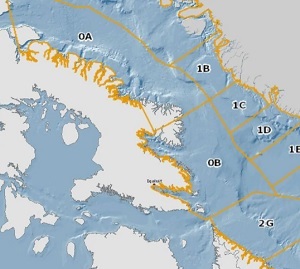
Nunavut Inuit suing feds over fishing license allocations to Mi’kmaw company
In a lawsuit filed earlier this month, Nunavut Tunngavik Incorporated and the Qikiqtani Inuit Association asked the federal court to quash a decision by Canada’s Minister of Fisheries and Oceans to transfer the licences for Greenland halibut and shrimp from seafood company Clearwater Foods to the coalition, after the Mi’kmaw group partnered to buy the company in January. Reached by phone on Wednesday, Jordan, through her staff, declined to comment following her loss in Monday’s federal election. The lawsuit describes how Nunavut fishers have only held about 50 per  cent of total fishing quotas for all species off Nunavut’s coast, which Inuit argue is disproportionately low compared to the 90 per cent that fisheries in Atlantic provinces have off their own coasts, an acknowledgement the federal government and DFO have made on several occasions. >click to read< 09:28
cent of total fishing quotas for all species off Nunavut’s coast, which Inuit argue is disproportionately low compared to the 90 per cent that fisheries in Atlantic provinces have off their own coasts, an acknowledgement the federal government and DFO have made on several occasions. >click to read< 09:28
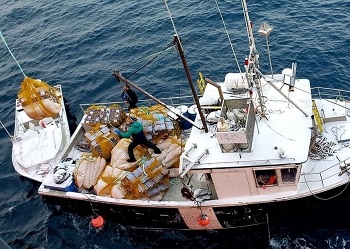
Nunavut’s fishing industry gets $3.2 million for exploration, promotion of six fishing and sealing projects
The Canadian Northern Economic Development Agency, also known as CanNor, announced the new funding on Thursday. The money will be distributed to six fishing and sealing projects throughout the territory. CanNor said that some of the funding is meant for promoting Nunavut’s fishing and sealing industries to new markets as well as for the promotion of redfish and char markets. A portion of the funding will be dedicated to studying the potential of small-scale inshore fisheries for three communities: Arviat, Kinngait and Sanikiluaq. >click to read< 18:55

Baffin Fisheries ex-CEO denies fraud accusations; countersues for $20M
The former CEO of the Baffin Fisheries Coalition (BFC) says he never defrauded the company, and is now countersuing the BFC for breach of contract and defamation. Last month, BFC launched a $1.4 million lawsuit against , alleging he was building on his private land in Winterton, N.L., and invoicing the work to BFC, and its subsidiary Niqitaq Fisheries, claiming it was for a project in Pond Inlet, Nunavut. click here to read the story 21:32
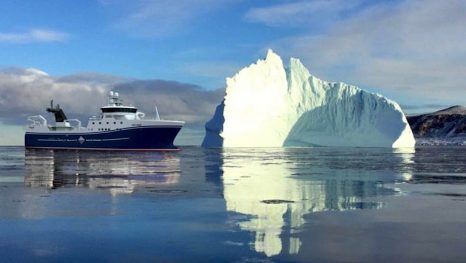
Nunavut’s Baffin Fisheries signs deal for new trawler
Baffin Fisheries, the largest shrimp harvester in Canada’s North, plans to add another vessel to its existing fleet of four. That intent was announced June 16 when the Inuit-owned Nunavut company said it had signed a letter of intent with Norway’s Havyard Ship Technology for the design and construction of a new Arctic trawler to fish cold water turbot and shrimp in the Arctic Ocean adjacent to Nunavut. The vessel under consideration is 75 metres long and 17 m wide, with a capacity to hold up to 1,200 tonnes—nearly double the capacity of the largest vessel currently operating in Nunavut. click here to read the story 14:40

Nunavut fishery gets a big boost in turbot quotas, expects a $7M to $8M increase in revenue
Last week, the federal Department of Fisheries and Oceans increased the total allowable catch for 2017 and 2018 by 575 tonnes in each of the two fishing areas adjacent to Baffin Island. “What it means, of course, if you’re looking at revenue on that amount of product, is somewhere between $7 million to $8 million of increase in revenue,” said Jerry Ward, the director of fisheries at Qikiqtaaluk Corporation. “Plus, it will also provide more jobs throughout the year and so on. So we’re quite pleased with it.” The limits on turbot in zone 0A, northeast of Baffin Island, was upped to 8,575 tonnes, with Nunavut fishermen receiving all of the increase. The limit in zone 0B, off Baffin Island’s southeast coast, was increased to 7,575 tonnes. Nunavut will receive 90 per cent of that increase, with Inuit fishers in Nunavik receiving the other 10 per cent. Read the story here 10:17
Last-in first-out policy squabble pits Nunavut and Labrador against Nova Scotia
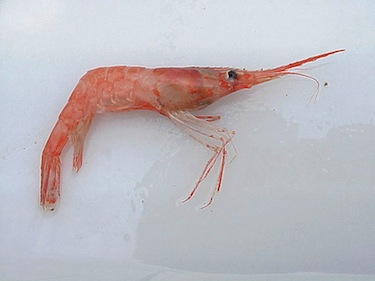 There’s a danger that Nunavut’s already inadequate share of offshore shrimp quota could get even smaller if the Department of Fisheries and Oceans continues to apply its last in, first out approach to allocating shrimp quotas, Nunavut Senator Dennis Patterson said last week. “All Nunavut asks for is to be treated fairly and to have the terms of their constitutionally protected Nunavut land claim respected,” Patterson said. Patterson’s contribution to the campaign comes at a time when various entrenched interests, especially long-established fishing fleets in Nova Scotia, are fighting to hold on to their total allowable catch in the face of shrimp stocks that are declining because of climate change. “Last-in, first-out,” or “LIFO,” is a federal policy that’s been applied to the northern shrimp fishery since at least 1997. Read the rest here 17:36
There’s a danger that Nunavut’s already inadequate share of offshore shrimp quota could get even smaller if the Department of Fisheries and Oceans continues to apply its last in, first out approach to allocating shrimp quotas, Nunavut Senator Dennis Patterson said last week. “All Nunavut asks for is to be treated fairly and to have the terms of their constitutionally protected Nunavut land claim respected,” Patterson said. Patterson’s contribution to the campaign comes at a time when various entrenched interests, especially long-established fishing fleets in Nova Scotia, are fighting to hold on to their total allowable catch in the face of shrimp stocks that are declining because of climate change. “Last-in, first-out,” or “LIFO,” is a federal policy that’s been applied to the northern shrimp fishery since at least 1997. Read the rest here 17:36
Seismic testing off Clyde River cancelled for summer
 Clyde River, Nunavut, is declaring victory after an energy company cancelled this summer’s plans for offshore seismic testing. “I’m very happy about it,” said Jerry Natanine, mayor of the hamlet on Baffin Island’s east coast that strongly opposed the seismic plans. The program is strongly opposed by the people of Clyde River, which argued before the board that the testing would disturb or harm seals, whales, walrus and other marine mammals locals depend on for food. Read the rest here 14:41
Clyde River, Nunavut, is declaring victory after an energy company cancelled this summer’s plans for offshore seismic testing. “I’m very happy about it,” said Jerry Natanine, mayor of the hamlet on Baffin Island’s east coast that strongly opposed the seismic plans. The program is strongly opposed by the people of Clyde River, which argued before the board that the testing would disturb or harm seals, whales, walrus and other marine mammals locals depend on for food. Read the rest here 14:41
Sealing advocates applaud idea of federal funding, but not approach

Nunavut hunters catch first bowhead whale in a century
 Clyde River, Nunavut, residents are celebrating a successful bowhead whale hunt, after catching their first in recent memory during the long weekend. The whale didn’t put up much of a fight, says Iqarialuk, but there was a dangerous encounter. “When they struck the whale, the whale flipped its tail and hit the boat. the hunters were in mid air, luckily they all landed back in the canoe,” Piungituk said. <Read more here> 07:16
Clyde River, Nunavut, residents are celebrating a successful bowhead whale hunt, after catching their first in recent memory during the long weekend. The whale didn’t put up much of a fight, says Iqarialuk, but there was a dangerous encounter. “When they struck the whale, the whale flipped its tail and hit the boat. the hunters were in mid air, luckily they all landed back in the canoe,” Piungituk said. <Read more here> 07:16
Clyde River, Nunavut to hunt first bowhead whale in a century, “We are all getting excited as the harvest time is getting closer,”
 A group of hunters in Clyde River, Nunavut has been selected to take part in the first bowhead whale hunt in over 100 years. Commercial whalers depleted the bowhead whale population to near extinction by the early 1900s. By 2008, the federal government asserted that bowhead whales were as abundant as they had been before commercial whaling took off. Read more here 09:15
A group of hunters in Clyde River, Nunavut has been selected to take part in the first bowhead whale hunt in over 100 years. Commercial whalers depleted the bowhead whale population to near extinction by the early 1900s. By 2008, the federal government asserted that bowhead whales were as abundant as they had been before commercial whaling took off. Read more here 09:15

































